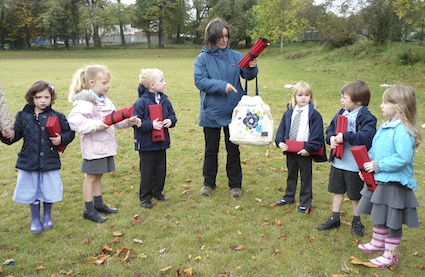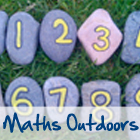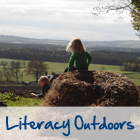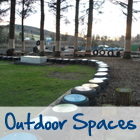
Today’s blog post is a little bit of light thinking around what makes an outdoor teacher:
- Is it your qualifications?
- Is it your attitude?
- Is it the length and type of your beard?
Read on and find out, by taking this quick quiz:
1. What does “outdoor learning” mean to you?
a) That’s what specialists teach. They have qualifications to teach outdoor pursuits. Or they are countryside rangers or wildlife experts. There’s now Forest School for keen teachers. That’s not my cup of tea.
b) We’ve been told to take the curriculum outside as it’s now part of Curriculum for Excellence. So I let the children work outside on nice days if they behave properly. There’s a file of outdoor learning activities in the staff room which I can look at for ideas. It’s a tool in my teaching toolkit and one of several approaches to learning.
c) Any learning can take place outdoors with a little bit of creativity and imagination.
d) Real outdoor learning is place-responsive. I’ve gone one step further and ensure that all my work is place-essential. Anything less than that is not proper outdoor learning and is a bit dubious. I consider myself an outdoor pedagogue. I like to fuse different systems and apply their philosophy outdoors, especially in nature. The results are amazing. I’m considering writing a book about my pioneering work. Would you like me to do a workshop for you?
2. Where is the best place to learn outdoors?
a) I don’t quite understand the question.
b) The outdoor classroom, of course. We’ve got picnic tables and a hexagonal shelter. It cost a lot of money and was paid for by the PTA.
c) It depends on the activity and the children in your class. When we plan learning experiences for children, we need to consider where the most suitable place is for the activity to happen. This may be part of the school grounds. It could be somewhere in the local area or even further afield.
d) The best place to learn IS outdoors.
3. Your head teacher is expecting to see evidence of outdoor learning in your termly plans. Do you:
a) Have a quick look online and insert a couple of outdoor activities which you know you can drop to ensure proper learning remains a priority. After all, it’s not as important as literacy and maths.
b) Plan one outdoor learning activity per week at a fixed allocated outdoor learning time such as Wednesday afternoon. You follow a set programme created by someone else.
c) Look at your plans and highlight the relevant parts in each curriculum area which you know will be best suited to being taught outdoors. As part of your continuous professional learning you have decided to focus on developing maths outside, so this is a particular focus within an interdisciplinary project.
d) Pardon? All my teaching activities take place outside. My “classroom” is a tipi on the playing field.
4. It’s raining and you had planned to undertake today’s literacy class outside. Do you:
a) Make the rational decision of staying inside. There’s always a few textbook pages to catch up on in your spelling, punctuation and grammar scheme.
b) Ask the children in such a way that they vote to stay inside. Then it’s their decision, not yours. And it means there’s less mess and that will keep the cleaner happy. And it will stop Fred’s parents from complaining. Phew!
c) Discuss the weather with the children. You have ensured that there are spare outdoor clothes and footwear available for anyone who needs it so the children and yourself make a joint decision as to whether or not to go out as planned or re-organise the day so that you go out when the rain has stopped.
d) Give a celebratory whoop of joy. There can never be enough rain in your life. You have at least three terms of linked up activities which make the most of every drop of rain for your challenge-based collaborative activities. Your enthusiasm will drench the children not the rain 🙂 🙂 🙂
5. You have been asked to be the lead teacher for a Primary 7 residential stay in an outdoor centre. Do you:
a) Phone your teaching union and negotiate pay or time off in lieu for additional hours required whilst away on residential. It is not in your contract to undertake residential activities.
b) Sigh, shrug your shoulders and pull out the paperwork from the last 10 years of visiting the same outdoor centre. At least you won’t need to plan the week and mark children’s work. And you can have fun on the zip wires and high ropes course.
c) Use the opportunity to plan a really interesting project with the children based upon the residential visit. As part of the process, the children research and evaluate a range of outdoor centres against agreed criteria. You meet with the parents and carers and work to ensure every child is able to attend. The preparatory and follow-up work ensure a seamless flow of learning.
d) Review the current practice and put in place not simply a Primary 7 residential but a progression of residential stays beginning in nursery and Primary 1 with joint overnight camping trips organised in conjunction with the PTA and finishing in Primary 7 with a week in The Netherlands. In between includes a field centre visit, a city stay, a winter sports activity week, a marine eco-stewardship residential and a working weekend on an organic farm for the Primary 4 class.
6. Your school has just been given £10K to spend on developing its grounds. Do you:
a) Wonder what that’s got to do with you. After all you’ve hardly spent any time out there.
b) Dig out the playground equipment catalogues and put together a 10K wish list. It should buy a nice trim trail and possibly even a bench or too.
c) Suggest that the school gets a site visit from an independent school grounds professional who can help the whole school community decide on their vision and put in place a sustainable action plan based upon a participative process which actively involves the children at each step.
d) Dust down your certificates which show that in a previous life you were a landscape architect and won international awards for your right-on sustainable, natural, play-friendly designs of outdoor spaces. Within the year, you have got the children creating the playground of their dreams and still have £500 leftover which you donate to a school which is less fortunate than your own.
7. You have been asked to mentor a student on placement who has to undertake a series of outdoor learning activities. Do you:
a) Let her get on with it. She’ll soon learn that it’s a passing trend in education. You’ve seen it all before.
b) Show her the unused outdoor maths box which was purchased two years ago. Perhaps this will help her along with a few free downloaded notices from an online resource company.
c) Spend time chatting to her and use the opportunity to create a really interesting series of interdisciplinary learning experiences which make the most of her skills and the interests of the children in your class.
d) Brightly suggest that as you know your stuff that all her placement takes place outside. You can show her three different ways to light a fire with and within the children. She will be given the best initiation to learning outdoors ever!
8. How do you demonstrate learning for sustainability in your teaching practice?
a) My class participated in a whole school litter pick last term. They learned not to drop litter.
b) We’ve an Eco School flag so although I’m not exactly sure what you mean, I’m sure I’m doing the right thing already.
c) I try to make the most of the school grounds and local area and community facilities. I use locally sourced materials, unwanted and natural materials in my teaching and involve the children as much as possible in decisions which affect them. I’m exploring a values-based approach after enjoying and seeing how much the children in last year’s class benefited from our John Muir Award project.
d) My class annually audits its ecological footprint and my practice – home and at school is carbon neutral. The children can quote the principles of environmental sustainability as it is their first homework task of the year. We have partner links with classes in other schools across the world and are part of the first outdoor ClusterBlogging group. My class know they are stewards of the school grounds which year-on-year become more biodiverse thanks to the monthly family action programme I have set up. I model positive environmental attitudes and behaviours and ensure that each day begins with a soft start which includes free play in nature all year round.
9. It is a secret santa gift arrangement in your school. You are given the name of a teacher who is passionate about learning outdoors. What will you buy this teacher?
a) Pass. Can I get a present for a different teacher please. A normal one.
b) Marks and Spencers do a nice line in fluffy gloves and matching earmuffs.
c) You decide to browse around for a clever little gadget from an outdoor shop. And then add in a few sticks for a laugh.
d) That’s me! I’m giving myself a present!
ANSWERS
- Mostly A’s: Oh dear! You are clearly not enthralled with the prospect of having to teach outdoors and clearly ensure that you do everything possible to minimise this possibility. I wonder what would happen if you found yourself working in an outdoor primary school in Sweden…
- Mostly B’s: Your responses feel lukewarm and half-hearted and I have the feeling that this is your attitude towards all aspects of teaching not just the outdoor element. To quote Yeats, “Education should be the lighting of a fire, not the filling of a pail.” I think you need to discover a passion in your life and apply this to your teaching – outside and in!
- Mostly C’s: Well done! You have clearly taken the time to think about how to make best use of the outdoors in your practice. I think you would enjoy working in a Swedish outdoor primary school and would ensure that this was mutually beneficial.
- Mostly D’s: Wow! Have you won the “Outdoor Teacher of the Year” award? Your passion and zeal are quite amazing. I’ve just heard you are hosting an school conference for a party of visiting Swedish outdoor primary teachers. Can I come along too?




















Absolutely love this quiz! Spot on! 😂 And gave me loads to think about! Mostly C’s… 🌻
Thanks for commenting and it sounds like you’re well on track 🙂